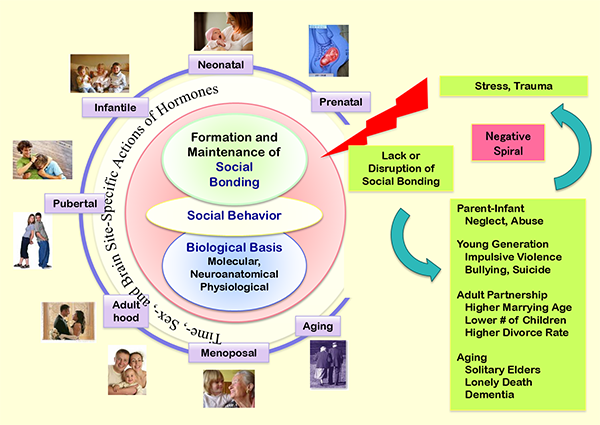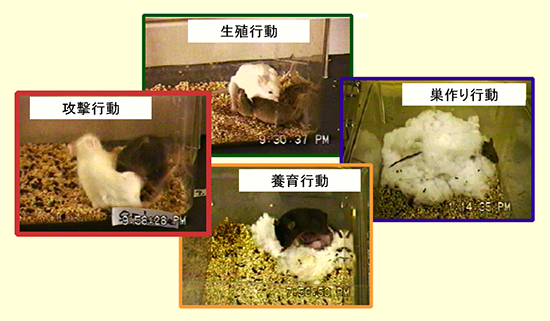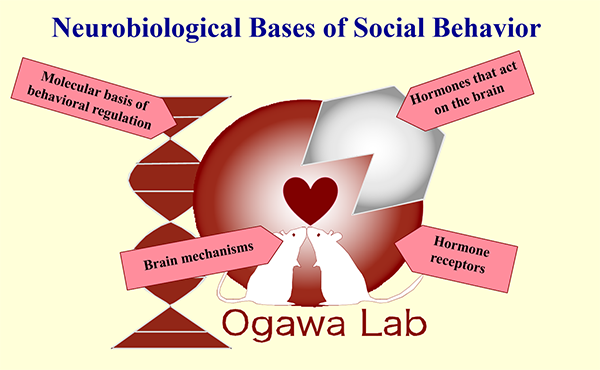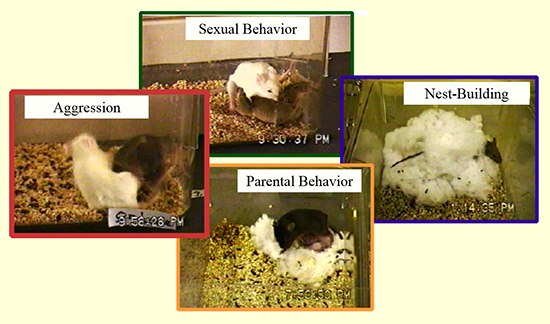キーワード:社会行動、個体間関係、行動の性分化、行動の分子神経内分泌基盤、臨床的応用
https://www.kansei.tsukuba.ac.jp/~ogawalab/
 人は一生の間に様々な絆を作り、 社会行動を営みます。こういった行動は男女の違い(性差)を抜きに理解する事はできません。例えば、性行動・養育行動・攻撃行動等には性差が顕著に表れま すが、これは特定のホルモンが脳内で作用することで、遺伝子の働きが変化し、それが行動としてあらわれるからです。ここでいうホルモンとは、生体の特定の 部位で働く生理活性物質のことです。このホルモンが、いったいどのように人間関係の形成に作用するのでしょうか。その秘密の解明を目指しているのが、この リサーチユニットです(図1)。
人は一生の間に様々な絆を作り、 社会行動を営みます。こういった行動は男女の違い(性差)を抜きに理解する事はできません。例えば、性行動・養育行動・攻撃行動等には性差が顕著に表れま すが、これは特定のホルモンが脳内で作用することで、遺伝子の働きが変化し、それが行動としてあらわれるからです。ここでいうホルモンとは、生体の特定の 部位で働く生理活性物質のことです。このホルモンが、いったいどのように人間関係の形成に作用するのでしょうか。その秘密の解明を目指しているのが、この リサーチユニットです(図1)。

親子・夫婦や仲間同士の愛着関係の秘密を脳に働くホルモンが解く
脳内のホルモンは胎児期から性差の形成に関わり始め、新生児期・思春期・成熟期から老年期まで様々な段階でもホルモンの制御をうけています(図2)。ホ ルモンは社会行動の変化を促し、その影響は人と人との間に築かれる関係性にも及びます。つまり、子供の頃の親子関係、仲間との親和関係、夫婦関係や親と なってから育む親子関係などにも性差やホルモンの働きが関わっているのです。このようなホルモンの役割はマウス等の他の動物でも観察されます(図3)。例 えば母子分離を経験したマウスは、性成熟期になっても正常な社会行動がとれない、というデータがあります。マウスの実験を通して、性や脳に働くホルモンの働きを分子的にDNA、遺伝子レベルで解明し、人の社会行動の理解につなげたいと考えています。

分子生物学の視点から社会性障害の理解を深める
社会行動は、個人の環境や経験、あるいは心理学的見地から説明される場合が多いのですが、私たちは分子生物学的な視点から社会行動を分析しています。最終 的には性差や攻撃行動、人間関係の維持に関わるホルモンの役割を解明し、現代社会が抱えている社会性障害のより深い理解につなげたいと考えています。これ は社会科学・心理学と生物学を融合させた「社会性の行動神経内分泌学」という新学術領域の確立にもつながります。この新領域で活躍できる若手の育成にも力 を注いでいきたいと考えています。
社会への貢献・実績
● 親子、夫婦、仲間関係などの個体間関係の形成、維持についての生物学的基盤の理解
● 個体間愛着関係の形成、維持を仲介する情動的、認知的機構の解明
● 他者との関係の形成における障害がもたらす諸問題についての臨床的取り組みへの寄与
● 日本唯一の社会性の行動神経内分泌学研究拠点の確立と、若手研究者の養成
● 研究会、シンポジウム等の開催論文や学会での研究発表活動

取材:平成25年5月16日
Functions of hormones in nurturing social bonds
Unit name:Translational Social Neuroscience on Hormonal Basis of Prosocial Behavior
Key words: Social behaviors, relationships between individuals, sexual differentiation of behaviors, molecular neuroendocrinological basis of behaviors, clinical applications
https://www.kansei.tsukuba.ac.jp/~ogawalab/?lang=en
 Humans create various bonds over a lifetime involving social behaviors. Such behaviors cannot be understood without considering differences between men and women (sex differences). For example, sex differences are evident in sexual, nurturing, and aggressive behaviors. These behavioral differences are explained by actions of specific hormones that alter genetic programs in the brain. Hormones refer to physiologically active substances that function at specific sites in the living body. How do hormones function in the formation of human relationships? Our unit addresses this issue (Figure 1).
Humans create various bonds over a lifetime involving social behaviors. Such behaviors cannot be understood without considering differences between men and women (sex differences). For example, sex differences are evident in sexual, nurturing, and aggressive behaviors. These behavioral differences are explained by actions of specific hormones that alter genetic programs in the brain. Hormones refer to physiologically active substances that function at specific sites in the living body. How do hormones function in the formation of human relationships? Our unit addresses this issue (Figure 1).

Figure 1: Scheme, representing neurobiological bases of sociality, “hormones,” “DNA,” “mice,“ and “affection between individuals”
Hormones that function in the brain can be studied to elucidate the secrets of affection between parents and children and between friends.
Hormones in the brain start to be involved in the formation of sex differences in prenatal period, and continue to regulate behaviors at later stages, including the neonatal period, puberty, adulthood, and senility (Figure 2). Hormones promote changes in social behaviors, influencing relationships between individuals. Specifically, sex differences and hormonal functions are also involved in relationships between parents and children both in child- and adulthood, friends, and married couples. Such hormonal functions are also observed in other animals, such as mice (Figure 3). For example, mice separated from their mothers in childhood fail to show normal social behaviors even in the sexual maturation period. We study the functions of hormones that act on the brain and sex at molecular and genetic levels through experiments in mice. Our study will facilitate the understanding of human social behaviors.

図2:ホルモンの作用は生涯に渡り生育と社会行動に影響を及ぼす
Understanding social impairments from the perspective of molecular biology
Social behaviors are often described from the perspectives of individual environments and experiences and psychology. We analyze social behaviors from the perspective of molecular biology. We aim to understand social impairments in modern society by elucidating functions of hormones involved in sex differences, aggressive behaviors, and maintenance of human relationships. Our study will also lead to the establishment of a new academic field, “behavioral neuroendocrinology of sociality,” which combines social science, psychology, and biology. We will also make efforts to train young scientists who can play an active part in this new field.
Social contributions and achievements
- Understanding of the biological basis for the formation and maintenance of relationships between parents and children, married couples, and friends
- Elucidation of emotional and cognitive mechanisms that mediate the formation and maintenance of affection between individuals
- Contribution to clinical efforts to solve problems caused by failures in the formation of relationships with others
- Establishment of the first neuroendocrinological research center for social behaviors in Japan and education of young researchers
- Study groups, symposia, presentations at academic conferences, and publications in academic journals

Figure 3: Mouse behaviors regulated by hormonal actions
Interviewed on May 16, 2013
